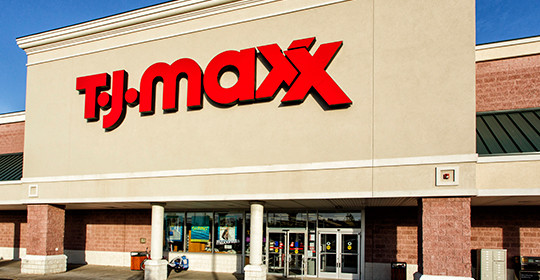
Is T.J. Maxx the best retail store in the land?
The off-price chain has built a fantastically loyal following. How have they done it?
We got inside the playbook of parent company TJX.
PLAY NO. 1 – Sell “New,” not a “Sale.”
The off-price business is a volume game: selling a ton of goods and selling them fast. The measure of speed here is how quickly a company turns over its inventory: TJX does that every 55 days, vs. 85 for its peer group, according to Morningstar. Indeed, the company is structured to whisk items through its distribution centers and stores—and a lot of items they are: TJX shipped some 2 billion units to its stores in its 2014 fiscal year (which ended on Feb. 1), up from 1.6 billion in fiscal 2010.
PLAY NO. 2 – Put real treasure in the treasure hunt.
Hardly anyone goes to a Marshalls or T.J. Maxx to find something specific. That’s not the point. Someone seeking a Tory Burch boatneck tunic ought to go to a department store. At an off-price chain, the lure is the serendipitous discovery. “In academic terms, it’s hedonic shopping motivation,” says William & Mary professor Hess. “You’re shopping for adventure and exploration.” In the industry, the experience is simply called the “treasure hunt.”
PLAY NO. 3 – “The money is in the buy.”
TJX’s buyers make the model tick. “If you can buy it right, you can sell it cheap,” Davidowitz explains. “The money is in the buy. They know that better than anyone.” The company’s buying organization is considered one of the best in the business, and on Meyrowitz’s watch it has grown from a force of 450 to more than 900. In order to develop an expertise in a specific category of goods, TJX’s buyers focus much more narrowly than their department store counterparts; rather than be responsible for accessories, a TJX buyer might specialize in just handbags.
PLAY NO. 4 – Have the vendor make it for you.
Most shoppers think all of the goods at T.J. Maxx, Marshalls, and their sister chains are what the company calls “opportunistic buys” – overruns, closeouts, irregulars, etc. It’s a myth. For one thing, there simply isn’t enough of that kind of inventory to supply TJX, let alone the other off-pricers. (If there were, it wouldn’t reflect well on the business savvy of legions of suppliers.) Says Paul F. Rosengard, president and CEO of supplier Boston Traders, which sells outdoor lifestyle men’s apparel: “If, as a manufacturer, all of your shipments to the off-price channel were truly distressed goods, you’d be going out of business.”
PLAY NO. 5 – Take it all.
Even when TJX is buying upfront, it can still secure a good price, thanks in part to its huge size. TJX’s suppliers likewise benefit from the same economies of scale. But an even more compelling reason to sell to TJX is that the company can help its vendors grow. “The magic sentence manufacturers wants to hear is, ‘We’ll take it all,’” a CEO of a rival retailer told Fortune. “Marmaxx [the division that houses Marshalls and T.J. Maxx] can do that.” The company is big enough that it can spread the merchandise—both the diamonds and the roughs—throughout its thousands of retail outlets. That also means that brands that don’t want to advertise that they’re selling in off-price chains aren’t as visible. TJX, in fact, doesn’t advertise any of the brands that are in its stores. Meyrowitz told USA Today in 2011 in a rare interview: “We’re absolutely fine with every vendor saying they don’t do business with us. It’s a very important part of our relationship.”
PLAY NO. 6 – Suppliers aren’t used-car dealers.
One reason the supplier relationship with TJX is so strong is that it has gotten so bad with the department stores. “A lot of buyers beat up people in the market to try to get what they want, as if they’re making a one-time car buy and they’re never going to go back,” says a former TJX buyer. Department stores want concessions for advertising and markdown allowances. They want money for delayed deliveries and returns. D’Arienzo says he had a client pay $1 million in markdown money to a department store for a product that didn’t sell. “The contention between the two partners is really serious,” he says. Many describe it as adversarial.
PLAY NO. 7 – Find a CEO who gets retail.
The emphasis on the buying culture goes back to Meyrowitz, who has retail in her blood. Her father was a wholesaler, her mother an artist. She was a salesclerk at Fortunoff while attending Rider University and started as an assistant buyer at Saks after graduating. In 1983 she landed at Hit or Miss, part of an earlier iteration of TJX (see sidebar), where sources say she became a protégé of T.J. Maxx founder Ben Cammarata. “He knew she had something special when it came to being a merchant,” says Steven Wishner, a former executive for the company. “She had it.” Cammarata is still the company’s chairman of the board. Meyrowitz became CEO in January 2007, not long after TJX suffered what at the time was reportedly the largest data breach in history. Today she’s the third-highest-paid woman CEO of a U.S. public company, according to Equilar.
